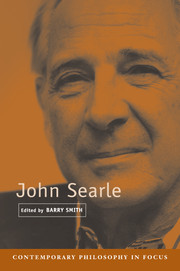Book contents
- Frontmatter
- Contents
- List of Contributors
- 1 John Searle: From Speech Acts to Social Reality
- 2 From Speech Acts to Speech Activity
- 3 Intentions, Promises, and Obligations
- 4 Law
- 5 Action
- 6 Consciousness
- 7 The Intentionality of Perception
- 8 Sense Data
- 9 The Limits of Expressibility
- 10 The Chinese Room Argument
- 11 Searle, Derrida, and the Ends of Phenomenology
- Further Reading
- Index
10 - The Chinese Room Argument
Published online by Cambridge University Press: 05 June 2012
- Frontmatter
- Contents
- List of Contributors
- 1 John Searle: From Speech Acts to Social Reality
- 2 From Speech Acts to Speech Activity
- 3 Intentions, Promises, and Obligations
- 4 Law
- 5 Action
- 6 Consciousness
- 7 The Intentionality of Perception
- 8 Sense Data
- 9 The Limits of Expressibility
- 10 The Chinese Room Argument
- 11 Searle, Derrida, and the Ends of Phenomenology
- Further Reading
- Index
Summary
The Chinese Room Argument is one of the widest and best-known single-issue debates in recent philosophy. Its name originates from a thought experiment proposed by Searle in 1980 in the paper “Minds, Brains, and Programs.” The debate has far exceeded the disciplinary boundaries of philosophy, and has had an impact especially in the fields of artificial intelligence and cognitive science. In 1990, Searle proposed a new, closely related argument that did not catch as much attention but that is, according to Searle, deeper and more powerful than the original Chinese Room Argument.
One of the striking features of the Chinese Room debate is the lack of consensus as to what exactly is the matter of controversy. One is easily reminded of the worry – charmingly expressed by Hume – that “questions which have been canvassed and disputed with great eagerness” often rest on some misunderstanding that tends to “keep the antagonists still at a distance, and hinder them from grappling with each other.” Since it is contentious even what the Chinese Room Argument is, it is one of my main aims to get clear about that. As we shall see, this will also help us in dealing with some hitherto unsettled controversies about its validity.
To anticipate, I am going to claim that there is a core of Searle's argument that is highly plausible (perhaps closely approaching the point of being “trivially true”) and in fact seldom contested by Searle's opponents.
- Type
- Chapter
- Information
- John Searle , pp. 214 - 260Publisher: Cambridge University PressPrint publication year: 2003
- 4
- Cited by

